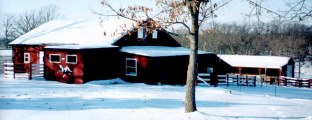More on cold weather...
COLD WEATHER PRECAUTIONS
With such a pleasant fall, we were beginning to think there would not be a winter this year, or at least the winter weather! Well, sure enough, frigid weather is on the way!
There are a few precautions we should take when really cold weather is on the way. Foremost, from both a veterinary and a horse owner’s perspective, is access to water. A common source of emergency calls in the early winter (when it is both after-hours and cold)  is a horse showing symptoms of colic (intestinal discomfort). This is usually due to impaction of the bowel.
is a horse showing symptoms of colic (intestinal discomfort). This is usually due to impaction of the bowel.
The bowel must have sufficient moisture to lubricate the lining for movement of the partially digested hay, grass, and grain. Without this moisture, movement will slow and the contents start backing up. Meanwhile, the intestine continues to push toward the exit, compressing the contents. On rectal exam, the areas of impaction feel like tubes of clay. As the volume of these materials increases, the horse starts feeling full and restless. With a little more time, gas starts building up behind the impaction, filling the bowel. As the bowel starts stretching, it starts to hurt the horse. To relieve the discomfort Dobbin will start showing the signs we all know as colic. He will start looking at his side, maybe kicking a little, acting restless, raising his tail or positioning to urinate, and finally lying down to try to find a comfortable position. This is when he attracts your attention.
To relieve the colic we must lubricate the bowel. This is usually with intravenous fluids to provide quick hydration. To provide lubrication, we use a stomach tube to administer mineral oil with a surfactant to help penetrate the mass. To buy time for the fluids and lubricants to work, we use pain relievers and antispasmodics. These provide relief to the horse so he is less likely to lay down and roll to relieve the discomfort. As we know, it is not the stomachache that causes the problem. It is what the horse does to relieve the discomfort that results in twisted intestines.
To prevent all of this from happening, there are a few things we can do to encourage water intake. Foremost is providing a clean source of ice-free water. When the water suddenly becomes cold, the horse will not drink as much as it needs to maintain hydration. If the water is frozen Dobbin may not be able to drink at all. With this reduced water intake, the amount of mucous lining the bowel is reduced and the movement of food materials is slowed. Does it sound familiar?
On many of our operations, it would be difficult to provide heated water, and pond water is often the only source of drinking water. Therefore we must encourage the horses to drink from their water source often enough to maintain body fluid levels. One of the easiest ways to do this is to increase the salt intake. Of course you already provide salt or a trace mineral block. During this early winter period we can be sure the horse is drinking enough by adding salt to its feed.  A rounded tablespoon of salt in the feed each day will encourage enough additional water intake to keep the body fluid levels adequate.
A rounded tablespoon of salt in the feed each day will encourage enough additional water intake to keep the body fluid levels adequate.
Shelter for the horse during cold weather is a topic that encourages discussion. We have often built adequate barns or shelters for the horse, only to have them stand beside them in the rain or cold. It has been my experience that a cold wind with cold rain or snow will send them looking for shelter! Providing the shelter will give the horse protection those few times. it wants it, and sure makes us feel good for doing it!
CLICK BELOW TO DISPLAY A PRINTER-FRIENDLY COPY OF THIS ARTICLE
Select "Open this file from its current location," if you just want to print it out,
it will open in a simple word processing application, select the print button.
(unless you want to save this article in your computer's memory)

 COLD_WEATHER_PRECAUTIONS.rtf
COLD_WEATHER_PRECAUTIONS.rtf